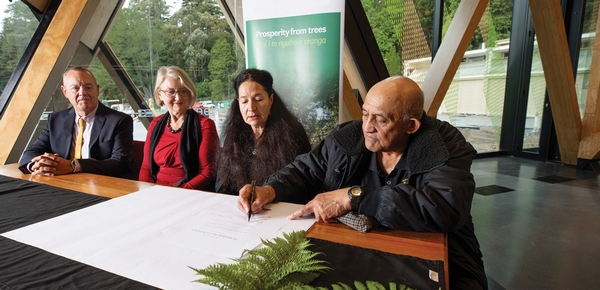Scion’s commitment to support the development of more Māori-led research saw the establishment of a new Te Ao Māori Research Group within Scion. Comprising a team of 12 kaimahi currently, the team will grow further to ensure delivery against Scion’s Strategy to 2030 and the Māori Forestry Futures Strategy which will in due course influence the way that Scion makes operational, investment and values-based decisions.
Our aim has been to put partner aspirations at the centre of our Te Ao Māori approach; to build resilient, enduring partnerships to go beyond Vision Mātauranga. Scion recognises that partnerships with Māori – as well as new and emerging industries, and central and local government – are critical to driving innovation from New Zealand’s forestry to achieve impact. We have listened to Māori experiences within the science system and acknowledge there is more that we can do to advance Māori interests and commit to meaningful and more satisfactory collaboration.
The Te Ao Māori Research Group will continue to build on three existing focus areas – Māori partnerships, mana whenua and Māori cultural competency – as well as strengthen our support for Māori-led and kaupapa Māori-based science and research.
Te Ao Māori research
At the heart of our Māori research sits people, whenua, the taiao and resources. The exercise of kaitiakitanga over indigenous flora and fauna, land, water, forestry and other natural resources places responsibility for taonga (mātauranga Māori; assets and cultural treasures) use with Māori. Scion acknowledges the Treaty of Waitangi, and as a Crown research institute we are committed to giving meaningful effect to the Treaty partner relationship.
Also, we give effect to the significant and unique impact that Māori people, resources and knowledge can contribute to New Zealand and global forestry and biobased futures. This means recruiting, developing and promoting culturally skilled scientists and researchers to deliver quality outcomes in science and impact through these specialist areas of knowledge. This will be Scion’s commitment to Aotearoa in years to come.
We have appointed leadership into the strategic areas of the business with two wahine Māori working as portfolio leads to drive research, science and innovation projects designed to achieve impact in: Restoration, Protection and Mauri of Te Waonui a Tāne, and Distinct Value of Indigenous Wood Products. These leaders along with others in Te Ao Māori Research Group will be leading our representation, and continuing to introduce our partners into emerging Māori IP, Māori genetics, and Māori data sovereignty forums and discussions.
Mana whenua at Te Papa Tipu
We are immensely proud of our distinctive relationship with mana whenua - Ngāti Hurungaterangi, Ngāti Taeotu, Ngāti Te Kahu (‘Ngā Hapū e Toru’). Providing on-site residence for a mana whenua representative has enabled a more meaningful partnership to occur, and Scion has embraced the leadership, advice and guidance generously provided by mana whenua.
Ngā Hapū e Toru gifted the name of their eponymous ancestor, Tuteata, for the grand new whare ‘Te Whare Nui o Tuteata’. Scion acknowledges and embraces the duty of care for the name and the cultural and partnership intent.
A kawenata (covenant) is being developed between Scion and Ngā Hapū e Toru to formally establish an enduring and intentional partnership.
A new position was created within Scion, co-appointed with mana whenua and supported by Te Uru Rākau Timberlands, to provide a permanent voice and continued participation of mana whenua at Te Papa Tipu.
Māori cultural competency
Scion has an important role in enabling the advancement of Māori aspirations to achieve transformational impact in regional communities. To do this effectively, it is crucial that we keep our staff culturally safe, equip them for quality engagement and demonstrate our commitment to working in a quality way with tangata whenua.
Scion will continue to invest in our people to increase capability and capacity. Over the past12 months we engaged the services of Te Whenua Consulting to provide advice on training and deliver Treaty of Waitangi/Wai 262 workshops to more than 70 staff including our executive and Board. These workshops provided our staff with greater insight into how Te Tiriti applies in our work and society in general, and particularly the consideration we must give to Wai 262 when embarking on our science and research projects.
With the development of critical capabilities in Scion, the space created will enable Scion and Te Ao Māori to achieve mutually beneficial outcomes.

< Previous | Māori partnerships >
